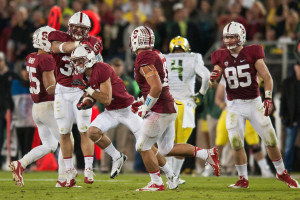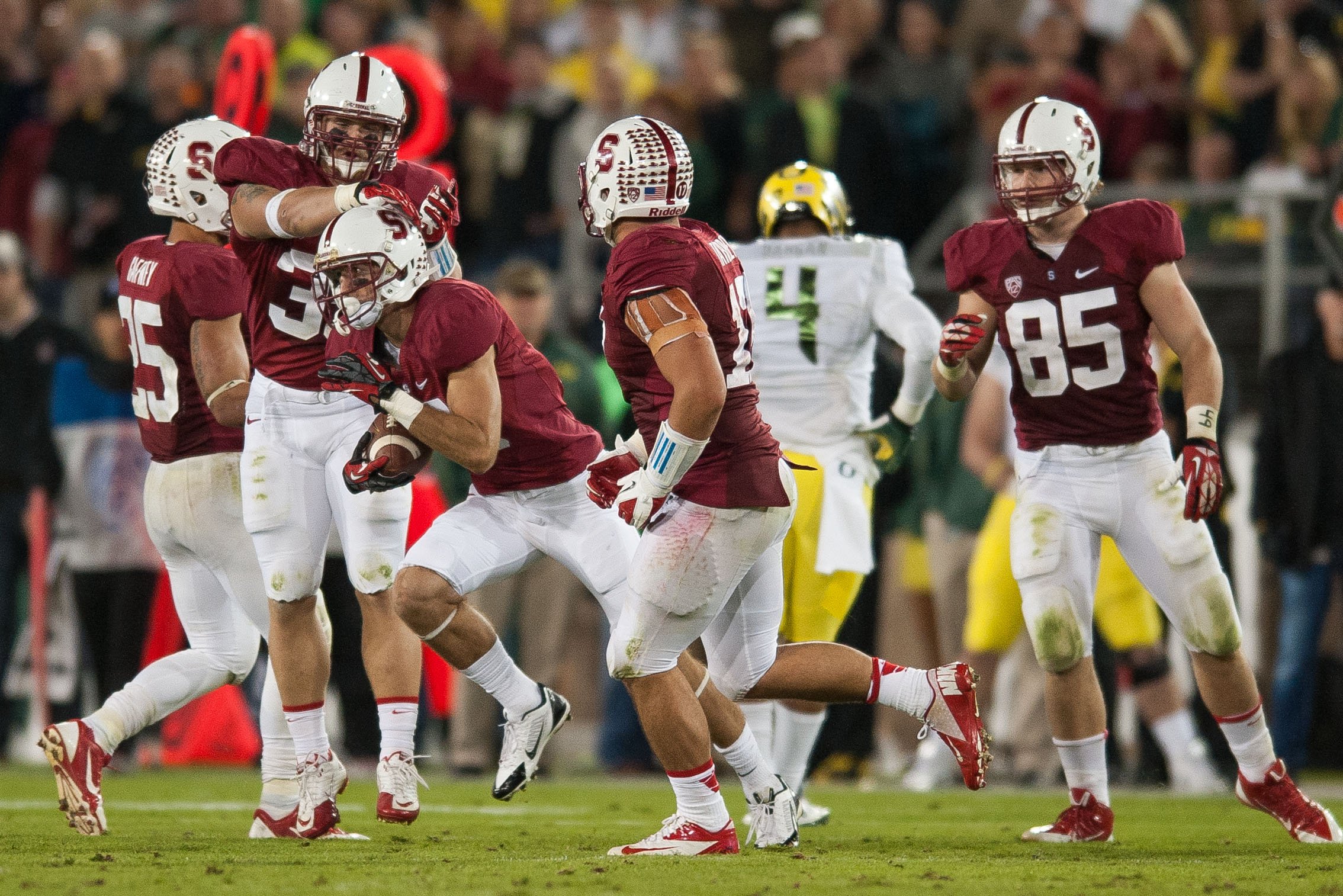The No. 4 Stanford football team has watched a whole lot of Trojans on film this week, but one of them doesn’t go to USC.
The exception is Cardinal senior Jeff Trojan, a walk-on wide receiver whose face was plastered across over four million television screens last Thursday night against then-No. 3 Oregon as he successfully recovered two of the Ducks’ three onside kicks in the fourth quarter.
There’s a saying in football that backup quarterback is the least important position on a team’s roster until it becomes the most important position. Trojan’s job as Stanford’s designated onside kick man might compete for that title.

“You’ve got to be courageous to stand in there with everybody coming at you,” said special teams coach Pete Alamar. “It’s one of those things that might never come up in a season; it might come up five times in a season. You just don’t know when it’s going to happen.”
Trojan’s road into the college football spotlight was not an easy one. He was recruited primarily by Ivy League schools out of high school — no, USC was not among the interested teams — and walked on at Stanford, which didn’t sign a single scholarship receiver in his class.
Trojan didn’t see the field in his first three seasons, but he earned the Greg Piers Service Team Award after his junior year for his special teams contributions. This offseason, however, he took the next step.
“It started in fall camp, and not in the team setting, but just having him stay after and our kickers hit balls to him,” Alamar said. “In fall camp, he probably fielded 200 onside kicks, just after practice, taking 10, 15 balls after almost every practice, and just getting comfortable with it.”
Trojan eventually broke through as the Cardinal’s go-to guy on onside kicks. Alamar said he earned the job due to his good hands, his tenacity and most importantly, his decision-making.
Onside kick recovery is deceptively complex; there’s more to it than just pouncing on the football. The four blockers on Trojan’s side of the field have to hold off six defenders charging in from just 10 yards away, while Trojan studies the bouncing ball as if it was one of his HumBio midterms.
“Generally there’s going to be a big hop; it just depends on when,” Trojan said. “If it’s early, then you’re going to have some little ones, or if it’s a bunch of little ones, then you’re going to have a big one. So then you just have to do a bunch of reps in practice, reading them and getting a feel for when the big hop is going to be. And then once that big hop happens, you’ve just got to go attack the football.”
If all goes well — as it did on the Ducks’ first onside attempt on Thursday — Trojan has just enough time to leap up (if the hop is late), corral the ball, turn his back to the defenders and fall to the ground.
But it doesn’t always work that way. With the Ducks trailing just 26-13 with 5:08 left in the game, Oregon kicker Alejandro Maldenado’s second onside kick of the night took an early hop. Instead of picking the ball out of the air, Trojan hesitated, letting the kick bounce again before it hit him awkwardly in the chest. Trojan took a big hit, the ball squirted loose and the Ducks recovered.
“I read it incorrectly,” he said. “It took an earlier hop that I should’ve went and attacked right away.”
Trojan got the chance to make up for his mistake on Oregon’s third onside kick. With 2:12 left in the game, a successful recovery by the Ducks would have given them more than enough time to erase Stanford’s 26-20 lead. The balance of power in the Pac-12 North — and the BCS — rested on the shoulders of the walk-on who had first played in a college football game just two months earlier.
This time, Maldonado’s kick took a late hop, and Trojan stretched out to grab it just moments before an Oregon defender flew in. With the game secured, Trojan raced back to the Cardinal sideline — football in hand.
“To be honest with you, I don’t know if he kept [the ball],” Alamar said. “You could see how important it was to him and how excited he was.”
Though the Cardinal will probably be happy if it never is in a close enough game to require Trojan’s recovery skills again this season, the senior still has to prepare for USC like the rest of his teammates do. Believe it or not, the one thing that isn’t a huge conversation topic in the locker room this week is Trojan’s name.
“I’ve never gotten any flak for it,” he claimed. “Honestly.”
Contact Joseph Beyda at jbeyda ‘at’ stanford.edu.
